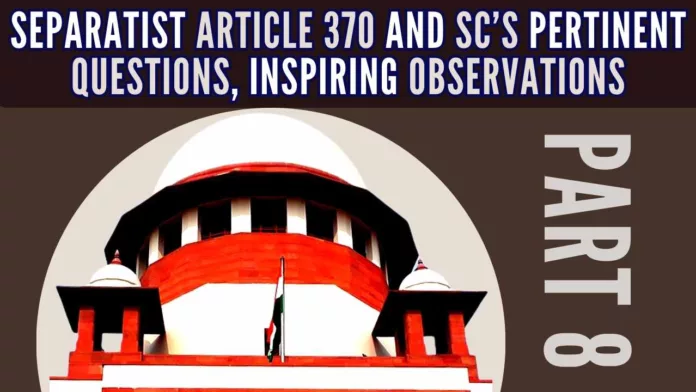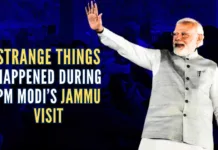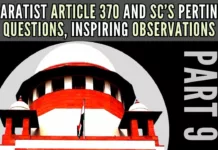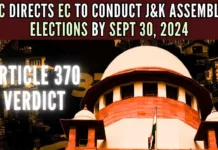
The previous 7 parts of the article can be accessed here Part 1, Part 2, Part 3, Part 4, Part 5, Part 6, Part 7. This is the eighth part
SC hearing on Article 370 abrogation
On September 5, the hearings were concluded and the constitution bench reserved judgment. It was virtually a day of the petitioners. Advocates Gopal Subramanium, Rajeev Dhavan, Dushyant Dave, Zaffar Shah, and CU Singh advanced arguments against the respondents’ arguments. As was expected, all the five petitioners’ counsels urged the Supreme Court to treat the Kashmiri Muslims a race apart, reject outright the otherwise historic August 5, 2019 reform scheme as introduced by the Narendra Modi government, and restore the pre-August 5, 2019 politico-constitutional status in J&K so that the Kashmiri Muslim leadership could again exercise absolute, unbridled and extraordinary legislative, executive, and even judicial powers. Not one petitioners’ counsel referred even once to the aspirations of the people of Jammu and Ladakh. To them, Kashmir meant the whole of J&K, including Ladakh. They sought to create an impression that Kashmir is the sole factor in the region’s political situation. For them, the separatist urges were sacrosanct than anything else, including the nation’s sovereignty and country’s territorial integrity.
Article 370 an article of faith
Gopal Subramanium started his arguments with a complaint. His complaint was that the petitioners’ counsels were being dubbed “separatists” by the other sidev. And his arguments in the defence of petitioners read like this: “It (370) might have been a temporary provision initially. But the provision has adequate evidence to suggest that it could be there to stay. This is the crux of the matter. It was the Constitution of India that gave the people of J&K to have the ability to determine their political future. The (Indian) Constitution does recognize the J&K Constitution. Please see the text of Article 370. The Constitution Seventh Amendment Act in Article 152 inserted the words ‘excluding the State of J&K.’ The Seventh Amendment was assented on 19th Oct 1956. By then, the draft constitution of J&K was introduced on 10.10.1956. The word ‘recommendation’ was chosen consciously because the Constituent Assembly of J&K was not constituted by the Government of India, it was under the proclamation of the Maharaja. A claim of the untrammeled power of the President is flawed. What is the further integration we are talking about? It is an Article of faith, it’s a parchment of pride for the people of J&K.”
What did Subramanium say when the Chief Justice said that “the domain of the Constitution of J&K was that which was defined by the Constitution of India”; that “this was not therefore a Constitution which was at par with or superior to the Constitution of India”; that “the President would appoint judges to the High Court of J&K”; and that “the President would transfer judges from High Court of J&K” and asked “who would appoint judges to the High Court of J&K”?
Subramanium said: “If it (J&K Constitution) meant under the Constitution of India, it also meant the order under 370(1)…In this case, I am not saying it is superior. But I would not like to say that it is inferior because it has established courts of law and the legislature. It’s a Constitution. The J&K High Court owes its existence to this (J&K) Constitution. The legislature of J&K owes its existence to this (J&K) Constitution. These are institutions of a permanent nature established under the (J&K) Constitution. The Chief Justice (of India) is involved. The Chief Justice (of India) is referred to.”
Compromise with Kashmiris imperative
Rajeev Dhavan emphasized the need for a compromise on the constitutional organization of India. He, inter-alia, said: “The first question is of temporality because that goes to the real issue. What does temporary mean in 370? What are the conditionalities available as far as 370 is concerned? There are two sets of powers assigned to the Constituent Assembly – first, to reject the constitution-making process completely – that is 370(3). The Constituent Assembly didn’t exercise this power. To make it a balanced cooperative federalism, we find the words concurrence, consultation, and recommend. These are methods of cooperation in a cooperative federalism – and they’re writ large in Sixth Schedule.”
Dhavan also said: “Article 370 is a compromise. You will find many compromises. Take, for example, Article 25…Sikhs are allowed to carry their daggers. Do you want to get rid of that? You will have to have a constitutional amendment. This is a compromise. The entire Sixth Schedule is a compromise. The most important compromise of all concerned the privy purse. Any compromise in the Constitution follows from an important insight of Fali Nariman – if today we were asked to make a constitution, we would not succeed. Israel was never able to come to terms with a constitution because it never was able to evolve a compromise. This is the process of constitution making – to accommodate a large number of views and come to a compromise. It is stated that socialism and secularism are not recognized in J&K. It’s actually present in the J&K Constitution. Come to Section 13. Article 3 has a mandatory provision that you must circulate any bill for reorganization to that legislature. This is a mandatory provision.”
Article 370 a lifetime promise
The upshot of the whole argument advanced by Dushyant Dave was that Article 370 was a lifetime promise. He said: “There are two powers that are fiercely independent – Constituent power and the derivative power. We have now a third situation where a constitutional power is to be exercised by the President. Whichever way your Lordships look at this – democracy, federalism, rule of law – each one of them is a basic structure of the Constitution. Every one of these principles is completely thrown out of the window by this. Whichever their (the drafter’s) intention was they have mentioned in the Constitution. We don’t need to travel outside of it.”
Dave didn’t stop just here. He further said: “It is not the case of the Government of India that 370 has not worked for the last 73 years. Not one example to show that 370 has failed. Every time the government (of India) wanted to apply anything, it was automatically accepted by the State of J&K. 370 was never meant to be temporary. The only reason why it was made temporary was to give the Constituent Assembly a right. For 70 years, if the Government of India order after order exercises powers under Art 370, can it now lie and say that Article 370 is temporary? Because 370 had become a bone of contention with certain sections of the country. Nobody understands what 370 is. 370 integrates J&K with India. So it’s unfathomable that why is it that suddenly you get up and overnight do this? In their manifesto, the BJP categorically says in 2019 that we’ll abrogate 370. It is not that people of J&K will die if 370 is taken away. But people have a right to feel that can a constitutional promise be taken away like this. They’re also citizens of India, they are not foreigners. There is nothing, even after 2019. Violence has gone on unabated. People are being killed. Soldiers are dying. You have millions of troops…Yes, tourism has developed because Kashmir is the most beautiful place in the world. If constitutional morality is allowed to be trampled with, then nothing…It’s a lifetime promise. It’s not a promise for the moment. What are we seeing today? For 56 weeks, constitutional amendments taking powers of the Supreme Court…everyone is up in arms because the Constitution is so dear to us. You can’t rule by force all the time otherwise the governance is lost…These writ petitions should be allowed. Constitutional morality must be in the heart of all citizens. Let us not allow Union (government) to steamroll so that people lose their love and affection”[1].
Dave further submitted: “If constitutional morality is allowed to be trampled with…in this fashion, then nothing… Constitutional morality must be in the heart and bosom of all citizens…You can’t rule by force all the time and if you have to rule by force, then there is no governance at all”[2].
Give our self-governance back
Urging the constitution bench to allow the people of Kashmir to enjoy self-governance, Kashmiri advocate Zaffar Shah said: “Residual sovereignty remained with the Maharaja. It got transferred over to the people. It didn’t go into Article 1 or 370 – it has gone to the people. In the exercise of that residual sovereignty, the Constitution of J&K was made. In 1957, we adopted our own constitution. Prior to that, we had a Constituent Assembly. But after the constitution was adopted – the state government came under existence under the Constitution of J&K. At the same time, it is required to give concurrence under Article 370. Insofar as the development is concerned, they (Kashmiri Muslim leadership) say self-governance is better than good governance – give our self-governance back. They say the nation has to grow, we want to have a unified nation. Of course, very good thought. But for that, you need to win the hearts of people.”
J&K is different
The refrain of Kapil Sibal was that J&K could not be compared with other princely states and that J&K was entirely different. He said: “All through merger agreements, no exception except J&K. That was not conceived in terms of Article 370 itself. I provide a list of princely states that signed a merger agreement with Union. This is incorporated in these terms in the Constitution which was not done for anyone else. This shows that a merger was never contemplated except in terms of 370. All the others (princely states) became through proclamation part of the states and then became part of B states.”
When Chief Justice Chandrachud said that “equally the proclamation executed by Yuvraj says that the entire relationship between J&K and Union would be governed by Constitution of India and all previous understandings are superseded”, Sibal asserted that “J&K was not.”
“It was the only state excluded from Part B states. See the language is ‘Constitution of India to be shortly adopted shall be insofar as applicable to the state of J&K government…’ All other states followed a uniform pattern of integration, other than J&K. Bilateralism is at the heart of the process…There can’t be a unilateral act by the parliament. There is no silence in the Constitution. Article 370 has two colons, the rest are all semi-colons. The two colons reside in (d) and (3). Assuming there is silence, how will you read it under Constitution Orders 272 and 273? Because they deal with 370(3) as it stands. You will still have to say if they’re consistent with the unilateral notification to be issued by the President which isn’t there. So you cannot exercise that power independently. 370 is only a process of integration. We are dealing with a process adopted by the Government of India consistent with this process of integration. There is no unilateral declaration. When it comes to 370(1)(b), you have to consult or concur. If it comes to 370(1)(d), again consult or concur. When it comes to 370(3), you can abrogate without consultation or concurrence? How can that interpretation ever be accepted by a constitutional court? If you have to uphold (Constitution Orders) 272 and 273 you will have to uphold it on its own terms. If you look at Article 371, it starts with ‘notwithstanding anything in the Constitution’…368 would not apply to any provision of the Constitution in this chapter (Chapter XXI) is that not against basic structure? That’s a constitutional absurdity – that for individual articles you have to concur but for the whole abrogation you don’t have to concur? As far as J&K was concerned, they had an added proviso. That constitutionally means that the complete merger we are talking about dehors the proviso could not be done. If you give such power to parliament under 356, anything can happen. I am digressing a bit but with respect to Maharashtra, I said that if Maharashtra is upheld, it will happen again and it happened in Maharashtra itself,” Kapil Sibal argued.
President’s rule is undesirable
Sibal further said: “Once the dissolution took place, Article 356 could not be imposed. Any act of dissolution has to take place after the aid and advice of the Council of Ministers. Now coming to impossibility – an argument not raised in counter affidavits…If there is a constitutional obligation to be performed, then the principle of impossibility comes is…where is the obligation for 370? 370 says, ‘may’ not ‘shall’. Where is the question of impassibility? Then it is also not their case that they did it for national security. Pulwama happened in February 2019 during the President’s Rule. And then held elections in May 2019. What is the justification for not constituting the state for 4-5 years? Let the court speak on behalf of the people of India because this court or any government acts for the people of India. And it should not be that acts of India should be done when a part of the people of India are silenced…”
As for advocate C U Singh, he said: “Arguments are made which are completely contrary to facts on reorganization”[3].
Lone’s affidavit insult to injury
The constitution bench had on September 4 directed National Conference MP and the main petitioner Akbar Lone to submit an affidavit on September 5 swearing allegiance to the Constitution of India and accepting the country’s sovereignty unconditionally, “after the ‘Pakistan zindabad’ slogan that he raised in the J&K Assembly in 2018 kicked up a massive row during the constitution bench hearing on abrogation of Article 370.” It was only at the fag end of the proceedings that Kapil Sibal, appearing for Lone, submitted the affidavit.
The one-page affidavit, inter-alia read: “That I (Lone) am a responsible and dutiful citizen of the Union of India. I have exercised my right to approach this court through Article 32 of the Constitution. That I reiterate the oath taken while being sworn in as Member of Parliament to preserve and uphold the provisions of the Constitution of India and to protect the territorial integrity of India.”
Solicitor General Tushar Mehta raised objections as far as the content of the affidavit was concerned. He termed the content of the affidavit an insult to the nation’s injury and urged the bench to “read what was not written in the affidavit.” He said: “Lone had expressed no remorse in the affidavit for his alleged conduct”[4].
Closing the arguments, the Chief Justice said that “if any party to the case wanted to file a brief written submission/ note, they could do it in the next three days”[5].
(The last part of the article will appear on the day SC delivers the verdict or a day after.)
Note:
1. Text in Blue points to additional data on the topic.
2. The views expressed here are those of the author and do not necessarily represent or reflect the views of PGurus.
Reference:
[1] Article 370 Case Hearing: Live Updates From Supreme Court [Day 16] – Sep 5, 2023, Live Law
[2] Pro-Pak slogan row: Govt says Akbar Lone affidavit insult to injury; SC reserves order on Article 370 case – Sep 5, 2023, Indian Express
[3] Article 370 Case Hearing: Live Updates From Supreme Court [Day 16] – Sep 5, 2023, Live Law
[4] SC reserves verdict on pleas challenging Art 370 abrogation – Sep 6, 2023, Daily Excelsior
[5] Supreme Court reserves its verdict on batch of pleas challenging abrogation of Article 370 – Sep 5, 2023, The Tribune
For all the latest updates, download PGurus App.










